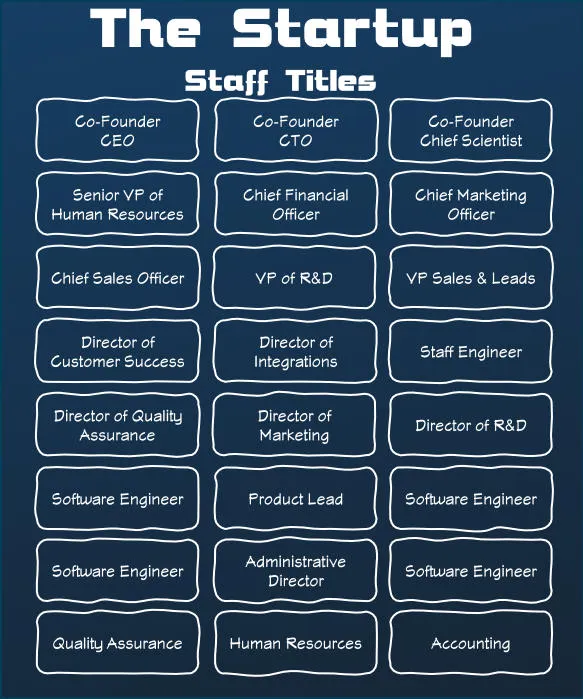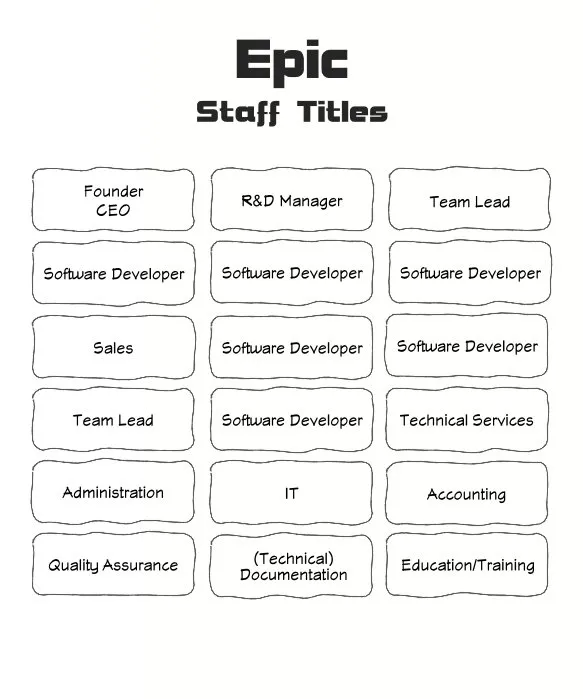Epic Culture-Not Many Titles
I routinely look at the “about” pages of startups and companies I’ve just learned about. A company of 5-30 people too frequently has a page of titles that are very similar to this:

In fact, I took inspiration from a few that I’d just looked at to make that graphic.
CEOs, VPs, CTOs, Senior VP of Human Resources, Chief Marketing Officer…
The list goes on and on. It’s hard to believe that anything gets done given introductions at meetings must take a half hour.
This type of culture and company isn’t the “gets stuff done” that I look for when researching companies or doing investing. The titles get in the way of a collaborative atmosphere. You can respect someone’s ideas, wisdom, knowledge, and accomplishments without needing a label or a title. If your company is bogged down in these titles, what other parts of the company are getting in the way of getting things done?
In late 1994 early 1995 at Epic, you can see below the titles that we generally had. Epic had been around for 15 years already at that point. Well beyond the startup phase. 😀

As you can see — there weren’t many. I may be forgetting one or two, but I think these capture the essence of what we had pretty well. Epic was very heavily invested in software development and it showed. Software developers made up the majority of the staff. We had no “levels” or titles for developers that had been on the staff for a decade or more. Software Developers were software developers.
Software developers, as generally defined by Epic at the time, focused on all aspects of creating software, from inspiration, design, to project completion and testing. Team leaders did not create designs and there were no architects on staff that were creating boring UML swim-lane diagrams to follow.
Epic was a small enough company that there wasn’t need for titles. We got things done. The things we created became our calling cards, not a title. An interesting side-effect of not having titles was that employees were not scratching and fighting their way for a new coveted title (definitely a story for later during my non-Epic years). Epic’s (unwritten?) policy was to provide opportunities to staff for them to experience growth in skills and responsibilities. Successful staff had more options.
The harder I worked, the more fun I had, with no new title required.
Honestly, it’s pretty easy to spot someone that talks about doing things and has a great title at a company compared to someone who builds software at a company. I understand some level of management, administration, etc., may be necessary part of doing business, but what about everyone else? Is the new hire more interested in their title or the work that they’ll be doing?
To be clear, even without titles, it wasn’t uncommon for more experienced R&D staff to concentrate on some particular aspect of software development and spend less time overall than another developer might on the same task. That’s natural and plays to an individual’s strengths and company needs. One developer might do more code review because the team had hired more staff for example (that’s likely my story for my next Epic post).
My challenge to new software startups: skip the titles and instead make a great product. Be concerned with titles another day (or maybe never?). Concentrate on the success of the people and the collaborative culture.
Thanks for reading my Epic post, but before you go… I have an email newsletter subscription with several support options now available! Please check it out and subscribe! I’ve had a lot of people tell me they enjoy the content but I’ve had so few subscribers it has been tough to be motivated to continue (and it’s a paid service to add to the demotivating factors). If you know of others who might enjoy this content, please tell them!
